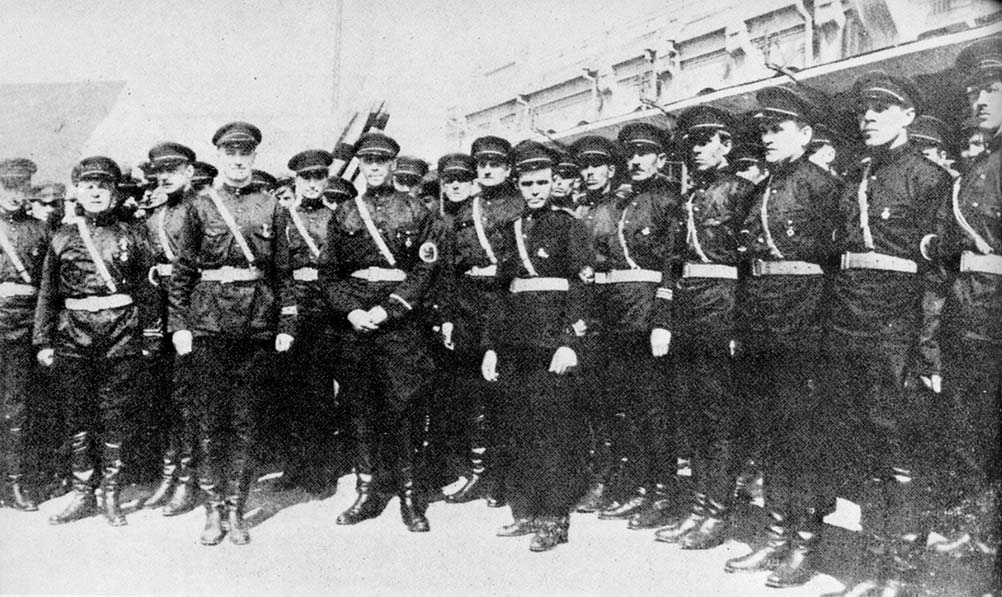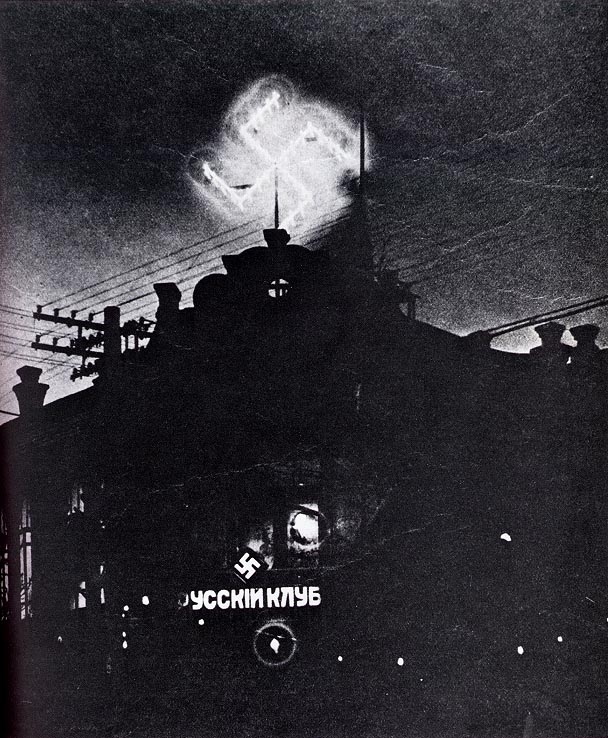1. Overview
Konstantin Vladimirovich Rodzaevsky (Константин Владимирович РодзаевскийRussian; August 11, 1907 - August 30, 1946) was a prominent Russian fascist leader who headed the Russian Fascist Party (RFP) from his exile in Manchuria. He emerged as a leading figure in the Russian Fascist movement after the defeat of anti-communist forces in the Russian Civil War, advocating for a virulent brand of fascism rooted in nationalism, anti-communism, and extreme anti-Semitism. Rodzaevsky's activities and ideology, deeply influenced by Benito Mussolini and Nazism, aimed at overthrowing the Soviet regime and establishing a fascist state in Russia. His party collaborated closely with the Japanese Empire and the Kwantung Army in Manchukuo, engaging in anti-Soviet propaganda and sabotage. Following World War II, Rodzaevsky was lured back to the Soviet Union under false promises of amnesty by the NKVD, only to be arrested, tried for "anti-Soviet and counter-revolutionary activities," and executed in a Lubyanka prison cellar. His legacy remains controversial, with his writings now officially recognized as extremist material in Russia due to their promotion of hatred and authoritarianism.
2. Early life and education
Konstantin Vladimirovich Rodzaevsky was born on August 11, 1907, in Blagoveshchensk, a small town and the administrative center of Amur Oblast in the Russian Empire. His family belonged to the middle class, a relatively rare and fragile status for the Siberian bourgeoisie of that era. His father, Vladimir Ivanovich, was a gentleman who worked as a notary and held a law degree. His mother, Nadezhda Mikhailovna, came from an old Blagoveshchensk family and dedicated herself to raising Konstantin, his younger brother Vladimir, and his two sisters, Nadezhda and Nina. During his adolescence, Rodzaevsky briefly became a member of the Komsomol, the youth organization of the Communist Party of the Soviet Union.
3. Exile in Manchuria and formation of political ideology
In 1925, unexpectedly to his family, Rodzaevsky fled the Soviet Union for Manchuria. He crossed the Amur River, and his whereabouts remained unknown for some time. By 1926, he was confirmed to be in Harbin, where his mother traveled with an exit visa from Soviet authorities to persuade him to return, but he refused. His mother returned alone, and they never met again. In 1928, his father and younger brother also escaped to Harbin, while his mother and sisters who remained in the Soviet Union were arrested by the GPU.
In Harbin, Rodzaevsky enrolled in a law academy, specifically the Harbin Sino-Russian Industrial School, to study law. During his studies, he was significantly influenced by Nikolai Nikiforov and Georgy Gins, which led him to embrace nationalism and anti-communism. He joined the Russian Fascist Organization. Shortly before his graduation in 1928, he was expelled from the university for leading a protest against the hoisting of the Soviet flag on campus. However, he was later reinstated as Soviet influence at the university waned, and he graduated in 1929. In the same year, he married Lydia Maslova, with whom he had two children, both of whom died young. He later divorced Lydia in 1936 and remarried Neolina Alisheva in 1937. With Neolina, he had a son, Vladimir, and a daughter, Olga, in addition to another child who died in infancy.
4. Leader of the Russian Fascist Party (RFP)
The Russian Fascist Party, under Rodzaevsky's leadership, developed a distinct ideology and organizational structure, engaging in various activities and forming crucial alliances, particularly with the Japanese Empire.
4.1. Founding and ideology

On May 26, 1931, Konstantin Rodzaevsky participated in the formation of the Russian Fascist Party (RFP) and was appointed its Secretary General. In 1934, the RFP amalgamated with the All-Russian Fascist Organization led by Anastasy Vonsyatsky, with Rodzaevsky becoming its de facto leader. He was officially elected party leader in 1936. Rodzaevsky consciously modeled himself and the party on Benito Mussolini's Italian fascism. The RFP adopted the swastika as one of its symbols, similar to the Nazi Party, and incorporated the double-headed eagle of the former Russian Empire into its emblem. Rodzaevsky surrounded himself with personally selected bodyguards, who wore black uniforms with black crossed belts, emulating the Blackshirts of Italy. The core ideology of the RFP was fiercely anti-communist, advocating for a nationalist and authoritarian regime in Russia. A notorious anti-Semite, Rodzaevsky consistently published articles promoting his anti-Jewish views in the party newspapers, Nash Put' (Our Way) and The Nation.
4.2. Organization, activities, and relations with Japan
The Russian Fascist Party established an extensive international organization of White émigrés, with its central office located in Harbin, which they referred to as the "Far East Moscow." The party managed to forge connections and establish branches in twenty-six nations across the globe, with significant international posts, notably in New York City. In Manchukuo, Rodzaevsky garnered approximately 12,000 followers.
The RFP received protection and arms from the Kwantung Army, the Japanese Imperial Army's main force in Manchukuo. In December 1934, Rodzaevsky was appointed the Second Department Head of the Bureau for Russian Emigrants in Manchukuo. During the 2,600th anniversary celebration of the founding of the Empire of Japan, Rodzaevsky, accompanied by a select group, paid his respects to Emperor Hirohito at the official ceremony held in the region.

To assert their presence and defiance against the Soviet government, the fascists installed a large swastika illuminated by neon lights at their branch in Manzhouli, located at least 1.9 mile (3 km) from the Soviet border. This neon sign was kept lit day and night. Rodzaevsky harbored ambitions of leading White Anti-Soviet forces, alongside White General Vladimir Kislitsin and Japanese forces, into battle to "liberate the people of Russia from Soviet rule." The Japanese were reportedly interested in establishing a White Russian regime in Outer Manchuria. The RFP's primary military activities involved the training of the Asano Detachment, an ethnic-Russian special force within the Kwantung Army, specifically organized to conduct sabotage operations against Soviet forces in the event of a Japanese invasion of Siberia.

4.3. Major writings
Rodzaevsky was a prolific writer whose publications served as key vehicles for disseminating his fascist and anti-Semitic views. Among his notable works were the brochure "Judas' End" and the book "Contemporary Judaisation of the World or the Jewish Question in the 20th Century." These writings elaborated on his anti-Semitic conspiracy theories and his vision for a fascist Russia.
5. World War II activities and party dissolution
During World War II, Rodzaevsky sought to intensify his open struggle against Bolshevism. However, the Japanese authorities, despite their earlier support, began to limit the activities of the Russian Fascist Party (RFP), restricting them primarily to acts of sabotage within the Soviet Union. In May 1943, Rodzaevsky was arrested by the Kempeitai, the Japanese military police, on suspicion of being a double agent. He was interrogated by the Kempeitai and RFP members, and his innocence was eventually confirmed. He was released in June and reinstated as the Second Department Head of the Bureau for Russian Emigrants. Nevertheless, the Kwantung Army significantly restricted the RFP's operations, prohibiting the public wearing of uniforms and singing of party songs from July 1, 1943. These restrictions ultimately led to the dissolution of the party.
6. Post-war exile and return to the Soviet Union
As the Soviet invasion of Manchuria commenced and the occupation became imminent in August 1945, Rodzaevsky fled Harbin and relocated to Shanghai, leaving his family behind. In the aftermath of the war, Rodzaevsky claimed to have experienced a "spiritual crisis." He asserted that Joseph Stalin's regime was evolving into a nationalist one, leading him to believe that Stalinism represented the ideal embodiment and realization of "our Russian fascism." In a lengthy personal letter, he offered explanations, made excuses, and admitted to his past mistakes. He acknowledged his participation in anti-Soviet activities but claimed these were "acts against the motherland out of love for the motherland." He also confessed to being wrong for supporting Nazi Germany, stating that he had believed Adolf Hitler could aid Russia by exterminating Jews. The letter displayed striking similarities with the doctrines of National Bolshevism, with Rodzaevsky declaring himself a "national Communist and convinced Stalinist." He wrote, "I issued a call for an unknown leader, ... capable of overturning the Jewish government and creating a new Russia. I failed to see that, by the will of fate, of his own genius, and of millions of toilers, Comrade J.V. Stalin, the leader of the peoples, had become this unknown leader." Rodzaevsky personally appealed to Stalin for forgiveness, referring to himself as "your unworthy slave."
In response to his plea, the Soviets offered him amnesty and a position as a journalist in one of their newspapers. Rodzaevsky returned to the Soviet Union, only to be arrested upon his arrival, along with fellow party member Lev Okhotin.
7. Trial and execution
The trial of Konstantin Rodzaevsky and other leaders of the Russian Fascist Party commenced on August 26, 1946, in Moscow, and was extensively covered by the Soviet press. The proceedings were opened by Vasily Ulrikh, the chairman of the Military Collegium of the Supreme Court of the Soviet Union. Rodzaevsky and his co-defendants were charged with a range of serious offenses, including anti-Soviet agitation, the creation of the Russian Fascist Party, and distributing anti-Soviet propaganda among White Army exiles. They were also accused of establishing similar anti-Soviet organizations in China, Europe, and the United States. Furthermore, the verdict stated that Rodzaevsky was involved in preparing an attack on the Soviet Union in collaboration with several Japanese generals, and that he personally organized spy and terrorist groups against the Soviet Union with the cooperation of German and Japanese intelligence. All of the defendants, including Rodzaevsky, pleaded guilty to the charges.
On August 30, 1946, Rodzaevsky was sentenced to death. Other individuals also sentenced to various punishments included Grigory Semyonov, Lev Fillipovich Vasilevsky, Aleksei Proklovich Baksheev, Lev Okhotin, and Ukhtomsky. Rodzaevsky was executed by firing squad in a cellar of the Lubyanka prison in Moscow on the same day.
8. Posthumous evaluation and legacy
In 2001, Rodzaevsky's final book, The Last Will of a Russian Fascist (Zaveshchanie russkogo fashistaRussian), was published in Russia. However, on October 11, 2010, the Central District Court of Krasnoyarsk ruled that the book constituted extremist material. Consequently, it was included in the Federal List of Extremist Materials (No. 861) in Russia, reflecting the official condemnation of his ideology.
Konstantin Rodzaevsky's historical assessment remains critical due to his leadership of a fascist movement that promoted extreme nationalism, anti-communism, and virulent anti-Semitism. His collaboration with the Japanese Empire and his efforts to undermine the Soviet Union during World War II highlight his role as an enemy of human rights and social progress. His later attempts to reconcile with the Soviet regime by claiming a "spiritual crisis" and aligning with Stalinism are widely seen as opportunistic rather than a genuine change of heart, further emphasizing the manipulative and self-serving nature of his political actions. His legacy serves as a reminder of the dangers of extremist ideologies and their profound negative impact on society.